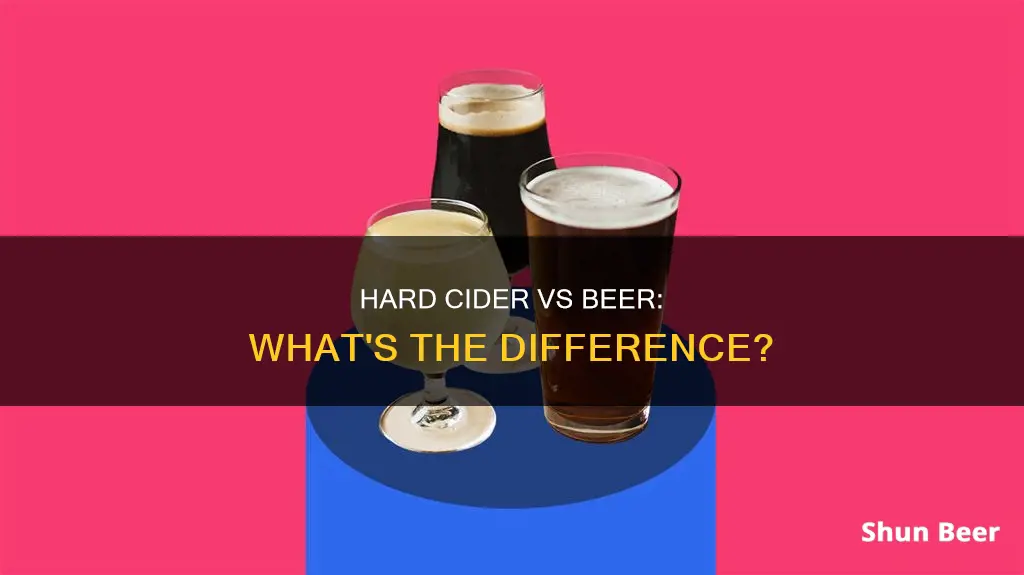
Hard cider and beer are both fermented beverages, but they differ in several ways. Hard cider is made from fermented apple juice, while beer is brewed from malt and flavoured with hops. Cider is naturally gluten-free, as it is made from apples, whereas beer contains gluten from the grain used in its production. Cider also tends to have a lower alcohol content than beer, with most ciders ranging from 4.5% to 7% ABV, while beer typically has a higher ABV. In terms of taste, cider offers a wider range of apple flavour combinations than the grape-based wine, and its flavour profile can vary from fruity to dry. Cider also tends to be lighter and less filling than beer, making it a good alternative for those looking for a drink with similar characteristics to beer but without the gluten or higher alcohol content.
What You'll Learn

Cider is made from fermented apples, whereas beer is brewed from malt and flavoured with hops
Cider and beer are two distinct beverages with unique production processes and ingredients. While both are fermented drinks, the key difference lies in their primary ingredients.
Cider is made from fermented apples, specifically the juice extracted from these fruits. The process typically involves pressing or grinding apples to obtain their juice, which is then combined with yeast to initiate fermentation. This sets cider apart from beer, as it does not contain malt or hops, the key components in beer production. Beer, on the other hand, is brewed from malt, which is typically made from grains, and flavoured with hops, resulting in a beverage that is often carbonated and can vary in colour and consistency.
The use of apples as the base ingredient in cider imparts a range of flavours and aromas, depending on the variety of apples used. Cider apples are considered the best choice, but cider can also be made from a wide range of apple varieties, each contributing different levels of acid, tannins, and sugar to the final product. The fermentation process further influences the taste, with slower fermentation resulting in sweeter ciders and faster fermentation yielding dryer ciders with higher alcohol content.
In addition to its unique flavour profile, cider also offers health benefits due to the presence of antioxidants and other nutrients found in apples. Cider contains polyphenols, which are natural compounds that can improve blood pressure and cholesterol, potentially reducing the risk of heart disease. Additionally, the carbonation in sparkling cider can aid in relieving stomach upsets. Cider is also naturally gluten-free, making it a suitable option for those with gluten intolerance or celiac disease.
While cider and beer have distinct characteristics, there is an emerging trend of blurring the lines between the two. Hopped ciders, for instance, incorporate hops, resulting in a cider with some of the flavour and aroma characteristics typically found in beer. Similarly, craft apple beers are being introduced, which involve adding apple juice to the brewing process or incorporating it towards the end. These innovations showcase the creativity and experimentation within the craft beverage industry, offering consumers an even wider range of choices.
What Makes Beer Gas Tanks Unique?
You may want to see also

Cider is gluten-free, whereas beer contains gluten
Cider is naturally gluten-free, whereas beer contains gluten. This is because cider is made from apples, which are gluten-free, while beer is typically made from gluten-containing grains such as wheat, barley, and rye. For those with gluten sensitivity or coeliac disease, drinking gluten-free alcoholic drinks is important. Coeliac disease is an inflammatory health condition where the immune system attacks the body after consuming gluten, causing damage to the small intestine and making it difficult to absorb nutrients.
The yeast used in cider fermentation is also typically gluten-free. However, it is important to note that some ciders may add flavourings or be produced in facilities that also brew beer, which could result in cross-contamination. Therefore, it is important to check the label or choose a brand of cider from a dedicated cider-making company.
Beer, on the other hand, is made with grain, which contains gluten. However, there are now gluten-free beers available, which have gone through a process to remove all the gluten from the drink. According to law, a beer can only be labelled as gluten-free if it contains 20 ppm or less of gluten. Nonetheless, there may still be trace amounts of gluten in these beers, which could cause a reaction in individuals with severe gluten sensitivity.
Oktoberfest Beers: What Sets Them Apart?
You may want to see also

Cider has a lower ABV than beer
In comparison, beer generally has a higher ABV than cider. While the ABV of beer depends on the brand and type, it typically ranges from 4% to 6%. However, some craft beers and specialty beers can have a higher ABV, ranging from 8% to 12% or more.
The lower ABV of cider makes it a good option for enjoying the buzz of an alcoholic beverage more responsibly. It's perfect for casual evenings with friends or as a chilled drink with dinner. You'll feel a gentle warmth of alcohol that's enjoyable and delicate.
Additionally, cider is often lighter in colour and has a thinner consistency compared to beer. Cider is usually carbonated, but there are low-carbonation options available as well. The major difference between beer and cider is that cider does not contain malt or hops, which are typically found in beer.
Beer Size Matters: How Larger Brews Differ
You may want to see also

Cider is often lighter in colour than beer
The colour of cider can also vary depending on the region where it is produced. For example, ciders from the South West of England tend to be higher in alcohol content and darker in colour. In contrast, mass-produced ciders often resemble sparkling wine in appearance and are lighter in colour. Similarly, modern ciders made from culinary apples are lighter in colour, ranging from pale to yellow.
The filtration process also affects the colour of cider. Unfiltered ciders tend to be cloudier and darker, while filtered ciders are clearer and lighter in colour. The length of time the cider is left to ferment can also impact its colour, with longer fermentation resulting in darker hues.
In summary, cider is often lighter in colour than beer due to the different ingredients used, regional variations, filtration processes, and fermentation times.
German Beer Imports: Different or Just Marketing?
You may want to see also

Cider has more sugar than beer
The amount of sugar in cider also depends on the type of apples used. Apples are naturally sweet, but cider-makers can also use more tart apples, which may require the addition of a sweetener. Some cider-makers add simple sugars to their cider, but others only use cider syrup, which adds a more complex apple flavour.
The sugar content of cider also depends on the fermentation process. Sweeter ciders are slowly fermented and then racked (moved to new containers) to strain the yeast that feeds on the cider's natural sugars.
The higher sugar content of cider means that it is typically higher in calories and carbohydrates than beer. A pint of cider with 4.5% ABV contains on average 215 calories, compared to 182 calories in a pint of beer with 4% ABV.
Mexican Beers: Unique Flavors and a Cultural Legacy
You may want to see also
Frequently asked questions
Hard cider is made from fermented apples.
Beer is made from fermented grain, hops, yeast, and water.
The main difference is that hard cider is made from fermented apples, whereas beer is made from fermented grain.
Yes, hard cider is naturally gluten-free. Beer, on the other hand, contains gluten unless it is a gluten-free variety.
It depends. While some hard ciders have a lower ABV than beer, there are also high ABV ciders that exceed the ABV of beer.







